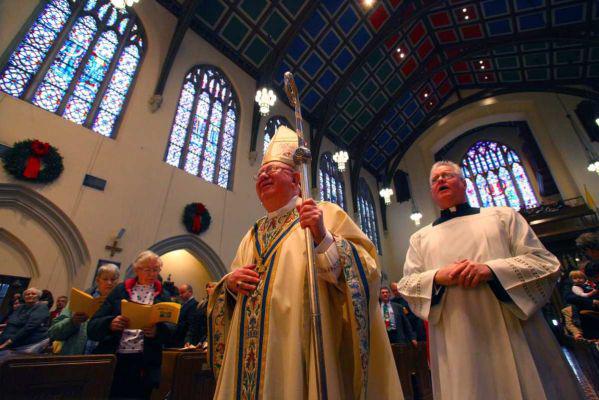|
Politics and the pastor William Murphy
By Bob Keeler
As a priest, in private moments with the ill or the grieving, Bishop William F. Murphy has been admirably pastoral and compassionate.As a bishop, he’s too often been autocratic, with a knack for committing unforced errors, marring his 15-plus years leading the Diocese of Rockville Centre. Unfortunately, it was not Murphy the gentle pastor, but Murphy the high-handed, controversial master, who shaped his image. Less than a week after his installation in 2001, terrorists destroyed the World Trade Center, killing nearly 3,000. In that tragic time, Murphy was at his best, reaching out quietly to comfort bereaved families. Then, at the start of 2002, The Boston Globe began its Pulitzer Prize-winning series about sexual abuse by priests and negligence by bishops in the Archdiocese of Boston, where Murphy had been Cardinal Bernard Law’s top aide. Though no one has accused Murphy of a crime, that series started a cascade of image-staining news. The headlines are familiar: his testimony before a Massachusetts grand jury, the same week that a Suffolk County grand jury issued a scathing report about sexual abuse here before Murphy arrived; his refusal to let Voice of the Faithful, a lay group arising from the crisis, meet on church property; his decision to commandeer a space that was to have ho-used six nuns; his taste for pricey appliances and a wine cooler that led then-Newsday columnist Jimmy Breslin to brand him “Mansion Murphy.” Despite the damage he caused himself by what he did in public, Murphy’s legacy could have been far more positive if he had made different decisions about what he chose not to do in public. Take Farmingville. An influx of day laborers had led to the rise of local anti-immigrant forces, reinforced by national groups. Violence flared: a 2000 attack on two laborers, then a 2003 firebombing of a house close to the Church of the Resurrection.For Connie Hornick, Resurrection’s social ministries coordinator, those were tough times. Though her faith led her to feed and clothe the laborers, public opinion on the men was divided, even among her volunteers. But the bishop and the diocese didn’t publicly weigh in. “There was a sense that, if we could keep the church out of it, it would be nice,” she said.Murphy did reach out to Hornick, to contact and comfort the firebombed family. But he didn’t publicly put the church on the side of the immigrants. “He sort of did it in the dark, at night, and didn’t want any publicity,” said Charles Funk, then active in Brookhaven Citizens for Peaceful Solutions, formed in 2000 to ease tensions. If Murphy had spoken out, Funk said, “it would have set a different tone.” The same was true in 2008, when seven teens killed Marcelo Lucero in Patchogue. Though Lucero was Catholic, his brother, Joselo (my colleague at the Hagedorn Foundation, where I’m a consultant), got this sense from people in the church: “We should not be doing anything for the family, or for him, because it’s too political, and there’s too much media.” Though the diocese told Catholic clergy in Patchogue to stay away from the politics, Murphy argued in 2012, “As a church, we were very much present.” Still, the funeral took place not at St. Francis de Sales, where Lucero had attended Mass, but at the Congregational Church of Patchogue. Its pastor, the Rev. Dwight Wolter, said, “Murphy wouldn’t touch that funeral with a 10-foot pole.” Murphy’s failure in both cases to speak prophetically for justice was striking. He served in Rome at the Pontifical Council for Justice and Peace, and he knows the church’s compassionate teaching on immigrants. “We’re not here primarily to be social tinkerers,” Murphy said in 2012. “We’re not the primary agents of social change.” In fact, Richard Koubek, a former Catholic Charities employee, said that Murphy de-emphasized the part of the agency’s mission that calls for “addressing the causes of injustice . . .” “He has crippled Catholic Charities in its ability to carry out its full mission,” Koubek said. “He’s cut their funding. Parish social ministry has been reduced to a skeleton.” As much as Murphy avoided “politics” in Farmingville and Patchogue, politics bookended his tenure. Weeks after arriving, he led a protest at a Planned Parenthood clinic. And last year, he ordered pastors to read his pre-election letter, which mentioned no names but clearly leaned Republican. In some parishes, it drew applause. In at least one, people walked out when it was read. In others, pastors declined to read it. Now, Murphy’s tenure is over. But in February, he said that he planned to remain here, moving from the “mansion” to the rectory next door — before he could have known the identity of his successor, Bishop John O. Barres, or asked his permission. Contradictorily, in March, Murphy told priests, “I am not giving . . . permission” to any retiring pastor to live in the parish he had just served. In Newsday, Barres has described his philosophy as a point guard at Princeton: “radical unselfishness,” passing the basketball to others. In contrast, Murphy is a ball hog: I’ll shoot. You just watch. I’m the decider. Barres shouldn’t listen to any autocratic whisperings from his predecessor-in-residence — and he should bring his basketball past to his church present, exercising true servant leadership, Pope Francis-style.
|
.
Any original material on these pages is copyright © BishopAccountability.org 2004. Reproduce freely with attribution.
